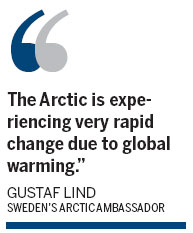China to increase input on the Arctic
Updated: 2013-05-16 07:55
By Li Xiang in Paris, Zhou Siyu and Cheng Guangjin in Beijing (China Daily)
|
||||||||

Nation wins long-awaited observer status from top-level regional forum
China pledged increased cooperation and contribution to peaceful and sustainable development in the Arctic as it was granted observer status by the Arctic Council on Wednesday.
China "appreciates and welcomes" the council's decision, Foreign Ministry spokesman Hong Lei said in a statement.
He reiterated China's support for the council, recognition of Arctic countries' sovereignty, and respect for Arctic residents' values, interests and culture.
The council is a high-level intergovernmental forum that addresses issues faced by Arctic governments and the indigenous people of the Arctic.
Analysts said the long-awaited observer status for China is a wise decision, and the country's participation in Arctic issues will help promote scientific research and trade in the region.
India, Italy, Japan, South Korea and Singapore were also granted observer status at the council's eighth ministerial meeting in Sweden. The European Union was tentatively granted observer status, but it must first address several questions about its bid, The Associated Press reported.
Gustaf Lind, Sweden's Arctic ambassador, said the council's members expect China to play a bigger role in the region's climate research and environmental protection, as China has already worked with climate specialists in the region.
"The Arctic is experiencing very rapid change due to global warming. Any help on the emission of carbon dioxide, from any country, will be crucial to slow this rapid change," Lind said.
China has been paying increasing attention to developments in the Arctic, and is stepping up its polar research. It applied to the council for observer status in 2006 and began to take part in the council's affairs and development in 2007 as an ad hoc observer.
"So there is the possibility for it to be more active within the council's different working groups," Lind said.
Sweden is the current chair of the council, which will pass to Canada after the meeting.
Damien Degeorges, a French Arctic expert and founder of the Arctic Policy and Economic Forum, said it is in the interest of regional governance within the Arctic Council to include non-Arctic states or entities such as China to take part in issues including polar research, climate change and the region's sustainable development.
"It is essential to involve them in polar and climate research and to enable more cooperation between major players on climate research, as this is where you can obtain the best data to adapt to climate change, which matters for countries including China," Degeorges said.
"The Arctic will be the new frontier of international relations and multilateral cooperation. And China, of course, wants to be part of that," he said.
Economic benefits
Closer ties with Arctic countries will bring China economic benefits, while its participation in the region is likely to promote commercial ties with Arctic states, especially Russia, analysts said.
Recent research data show Arctic ice is melting at an unprecedented speed. With temperatures in the region rising at a rate twice that elsewhere in the world, the Arctic is expected to be ice-free in coming decades.
There are three main shipping routes across the Arctic region - the Northeast Passage, Northwest Passage and Central Arctic Shipping Route.
Melting ice clears the Northeast Passage from the end of July for four months or more, while the central route is open from the end of August for one month or more, said Yang Huigen, director-general of the Polar Research Institute of China, the country's leading institute on Arctic research.
Plying the Arctic routes could cut the sailing time between major Asian and European destinations by almost one-third. This would reduce fuel costs for shipping companies, which have been increasing steadily in recent years.
Yang said, "Chinese ports, especially those in the northeast of the country, will benefit from the new routes. This could also boost Northeast China's regional economy." Anton Vasiliev, ambassador-at-large for Arctic cooperation at the Russian Ministry of Foreign Affairs, said in a recent interview that of all the sectors that might benefit, "the (Russian) shipping industry will benefit the most", as it expands its use of Arctic waters, especially to China.
China has also been forging closer ties with Iceland. On April 16, the two countries signed a free trade agreement, and heads of State from both countries reaffirmed future cooperation in the Arctic region.
Trade volume between the two countries in 2012 rose 21 percent from a year earlier to $180 million, and growth is expected to continue.
Last year, China sent its research vessel and icebreaker Xuelong to the Arctic for the fifth time. The vessel paid an official visit to Iceland, its first visit to an Arctic country.
Contact the writers at lixiang@chinadaily.com.cn, zhousiyu@chinadaily.com.cn and chengguangjin@chinadaily.com.cn
(China Daily 05/16/2013 page1)

 Michelle lays roses at site along Berlin Wall
Michelle lays roses at site along Berlin Wall
 Historic space lecture in Tiangong-1 commences
Historic space lecture in Tiangong-1 commences
 'Sopranos' Star James Gandolfini dead at 51
'Sopranos' Star James Gandolfini dead at 51
 UN: Number of refugees hits 18-year high
UN: Number of refugees hits 18-year high
 Slide: Jet exercises from aircraft carrier
Slide: Jet exercises from aircraft carrier
 Talks establish fishery hotline
Talks establish fishery hotline
 Foreign buyers eye Chinese drones
Foreign buyers eye Chinese drones
 UN chief hails China's peacekeepers
UN chief hails China's peacekeepers
Most Viewed
Editor's Picks

|

|

|

|

|

|
Today's Top News
Shenzhou X astronaut gives lecture today
US told to reassess duties on Chinese paper
Chinese seek greater share of satellite market
Russia rejects Obama's nuke cut proposal
US immigration bill sees Senate breakthrough
Brazilian cities revoke fare hikes
Moody's warns on China's local govt debt
Air quality in major cities drops in May
US Weekly

|

|







